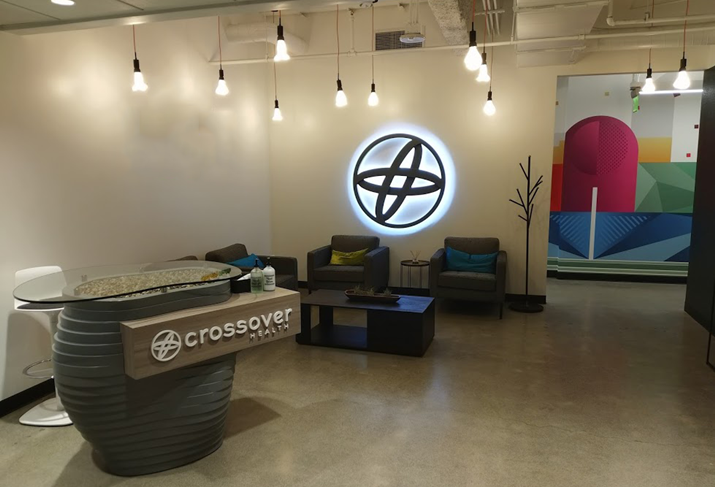
Crossover Health’s San Francisco location. Photo credit: Crossover Health
Crossover Health recently made headlines as it wrapped up the first phase of its partnership with Amazon, which involved opening 17 clinics near the retail giant’s distribution centers. But the primary care startup has several other big-name tech clients, and is seeing if insurers will also buy into its value-based care model.
The startup recently raised $168 million in an oversubscribed series D round led by private equity firm Deerfield Management. CEO Dr. Scott Shreeve said the company plans to use the funds to build out its software platform, partner with more companies as they develop return-to-work plans, and launch a pilot this summer with a national insurance company.
The idea is that an insurer could offer Crossover as part of a bundled suite of services to their fully insured population, or to employers who have struck an administrative services only (ASO) arrangement. Crossover did not confirm the name of the insurer.
“There’s a huge push towards outcomes. We want to show them the math of how this actually works,” Shreeve said in a Zoom interview. “We’re so bullish and so encouraged by the results of the model we want to be able to demonstrate that scale.”
San Clemente-based Crossover Health got its start in 2010, building onsite clinics for self-insured companies that include primary care, behavioral health, physical therapy and other preventive services. Apple was its first big customer — Crossover built a mock-up of its first clinic in Apple’s warehouse. Now it counts Microsoft, Comcast, and Amazon as its clients.
It also offers “near-site” clinics that multiple companies can use, and virtual visits — a feature it grew for remote workers through an acquisition in 2019, but became critically important during the pandemic.

A Deep-dive Into Specialty Pharma
A specialty drug is a class of prescription medications used to treat complex, chronic or rare medical conditions. Although this classification was originally intended to define the treatment of rare, also termed “orphan” diseases, affecting fewer than 200,000 people in the US, more recently, specialty drugs have emerged as the cornerstone of treatment for chronic and complex diseases such as cancer, autoimmune conditions, diabetes, hepatitis C, and HIV/AIDS.
So far, Crossover Health has opened 48 health centers across 11 states, and offers telehealth visits in all 50 states.
Other primary care startups have also entered the spotlight. Last year, One Medical went public, and Forward Health recently raised $225 million in funding.
But Shreeve said Crossover’s business model sets it apart in that it bundles together so many different services, and takes on the full cost of care. For employers where it offers onsite clinics, they pay on a per-population basis.
“There are a lot of new investments in primary care, and there really should be because that is the foundation of any good heath system,” he said. “The biggest differentiator is we offer these primary health services, we build this relationship with our members, and of course we stand accountable at the back-end to drive outcomes.”
Like his peers in digital health, Shreeve is also watching for more mergers and acquisitions in the future.
“There are so many thousands of these point solutions. It’s so confusing to employers,” he said. “I think we’re entering a chaotic but also potentially important consolidation phase and a turning point for how people think about these types of services.”














